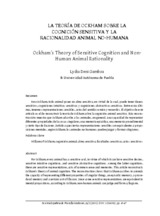La teoría de Ockham sobre la cognición sensitiva y la racionalidad animal no-humana
Ockham’s Theory of Sensitive Cognition and Non- Human Animal Rationality
Autor
Gamboa, Lydia Deni
Editor
UCOPressFecha
2019Materia
William of OckhamCognición animal
Alma sensitiva
Facultades sensitivas
Actos sensitivos
Animal cognition
Sensitive soul
Sensitive faculties
sensitive acts
METS:
Mostrar el registro METSPREMIS:
Mostrar el registro PREMISMetadatos
Mostrar el registro completo del ítemResumen
Para Ockham, todo animal posee un alma sensitiva, en virtud de la cual, puede tener deseos sensitivos, cogniciones intuitivas sensitivas y cogniciones abstractivas sensitivas. Entre estas últimas, tenemos representaciones sensibles, actos del sentido común y recuerdos. El objetivo de este artículo es el de reconstruir la teoría de Ockham sobre la cognición animal sensitiva. Esta reconstrucción muestra que Ockham adscribe a los animales, en general, una capacidad de representar diferentes propiedades de las cosas singulares, una memoria episódica, una memoria procedimental y cierto tipo de ilusiones. Debido a que ciertas representaciones sensibles son equivalentes a proposiciones mentales, según Ockham, los animales no-humanos pueden juzgar y formar silogismos. For Ockham, every animal has a sensitive soul, in virtue of which it can have sensitive desires, sensitive intuitive cognitions, and sensitive abstractive cognitions. Among the latter cognitions, there are sensitive representations, acts of common sense and memories. This article reconstructs Ockham’s theory of animal cognition. The reconstruction shows that Ockham ascribes to animals the capacity of representing different properties of singular things, an episodic memory, a proce-dural memory and a certain sort of illusion. Since some sensitive representations are equivalent to mental propositions, according to Ockham, non-human animals can judge and form syllogisms.

